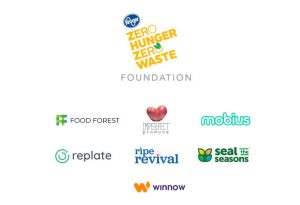CINCINNATI — Seven innovative ideas for preventing food waste or ending hunger have been selected from among nearly 400 applicants for grants of between $25,000 and $250,000 from the Innovation Fund, part of the Zero Hunger | Zero Waste campaign that Kroger Co. introduced in 2017 with the goal of ending hunger in the communities in which it operates and eliminating waste across the company by 2025.
 Kroger in February invited innovators to pitch ideas for preventing food waste or ending hunger, the dual aims of its Zero Hunger | Zero Waste program. To that end, the retailer set up a $10 million Zero Hunger | Zero Waste Innovation Fund as a signature program of the Kroger Co. Foundation, a public charity designed to catalyze collective action and direct resources where they are most needed to help transform Kroger communities.
Kroger in February invited innovators to pitch ideas for preventing food waste or ending hunger, the dual aims of its Zero Hunger | Zero Waste program. To that end, the retailer set up a $10 million Zero Hunger | Zero Waste Innovation Fund as a signature program of the Kroger Co. Foundation, a public charity designed to catalyze collective action and direct resources where they are most needed to help transform Kroger communities.
The inaugural grant recipients will use funds provided by the foundation to implement projects over the next 12 months, according to Kroger.
“We’re excited to see our inaugural cohort work toward meaningful and measurable solutions to prevent, recover and recycle food waste, with the possibility of reducing food waste by up to 7.2 million pounds,” Jessica Adelman, group vice president of corporate affairs for Kroger, said.
The inaugural cohort features:
- Food Forest, a Cincinnati-based company that Kroger said uses technology to source products through multiple channels, maximizing fulfillment efficiencies and minimizing the carbon footprint of delivery logistics. The Food Forest app uses dynamic pricing and recommendations to offer incentives to customers and mitigate wasteful behavior. It also provides pop-up grocery pickup points to low-access, high-need neighborhoods.
- Imperfect, an online grocer headquartered in San Francisco that Kroger said is creating a more sustainable and effective food system to better communities and the environment. The company sources imperfect produce and surplus food like grains, nuts, oil, bread, milk and cheese directly from farmers, growers and food purveyors and delivers them to participants of its customizable subscription service.
- Mobius, of Knoxville, Tenn., converts industrial organic waste streams from food, forestry and agriculture into renewable chemicals and materials, Kroger said. Its first products are biodegradable plastics and polymers created from industrial organic waste, with applications focused in agriculture, horticulture, and food-service packaging.
- Replate, a Berkeley, Calif.-based provider of technology to reliably redistribute surplus food from businesses and events to nonprofits. Kroger said that Replate is leveraging the gig economy in creating meaningful jobs while providing a simple platform for businesses and caterers to reduce their waste while supporting members of their community.
- Ripe Revival, a food brand based in Greenville, N.C., that is on a mission to reduce waste and feed those in need. Its nutrient-dense protein gummies are made utilizing proprietary extraction technology, providing a profitable solution for farmers’ excess produce. Kroger said its products maximize the potential of fruits and vegetables through nutritious, clean and fun foods.
- Seal the Seasons, of Chapel Hill, N.C., aims to increase access to local food by reducing on-farm food waste and providing family farms with a reliable income stream by selling locally- and regionally-grown fruits and vegetables year-round. It partners with family farms on a state-by-state basis to source local produce while in season, freeze it within 24 hours of picking, and sell it to local grocers in the grower’s home region.
- Winnow, of Iowa City, Iowa, builds artificial intelligence tools to help chefs measure food waste and provide stakeholders with transparent, measurable, and actionable data, helping run more profitable and sustainable kitchens. Kroger said the data communicates food waste reduction opportunities and details where food is being lost, whether as a result of customer food preferences or due to preparation, storage or overproduction issues.
“Kroger’s history of generosity is captured in the forward-looking mission of our Zero Hunger | Zero Waste Foundation, and we are committing up to $1 million in grants for the first cohort to inspire and capture the innovative thinking required to fix our country’s hunger food waste paradox,” Adelman said in February in announcing that the foundation was “crowdsourcing for solutions.”




You must be logged in to post a comment Login